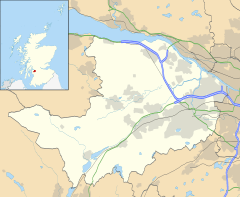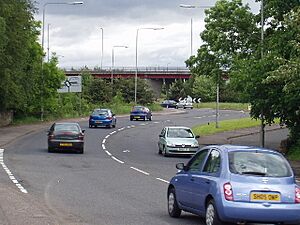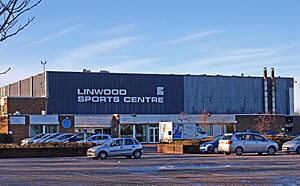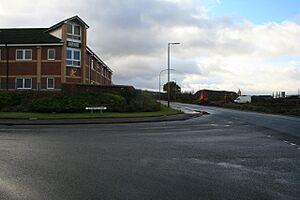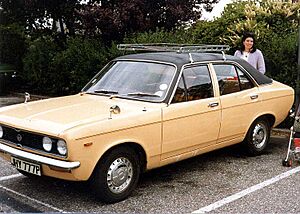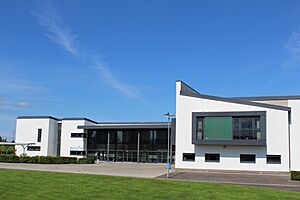Linwood, Renfrewshire facts for kids
Quick facts for kids Linwood
|
|
|---|---|
| Town | |
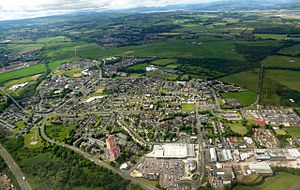 Linwood from above Black Cart Water |
|
| Population | 8,450 (2020) |
| OS grid reference | NS435645 |
| Council area | |
| Lieutenancy area | |
| Country | Scotland |
| Sovereign state | United Kingdom |
| Post town | PAISLEY |
| Postcode district | PA3 |
| Dialling code | 01505 |
| Police | Strathclyde |
| Fire | Strathclyde |
| Ambulance | Scottish |
| EU Parliament | Scotland |
| UK Parliament |
|
| Scottish Parliament |
|
Linwood (Scots: Linwuid) is a town in Renfrewshire, located in the west central Lowlands of Scotland. It is about 14 miles (23 km) west of Glasgow. The town is also about 1.5 miles (2.4 km) northeast of Johnstone and west of Paisley. It is close to the Black Cart Water river and the A737 road.
Contents
What's in a Name?
The name Linwood comes from an old Anglo-Saxon word worǒ, which means 'enclosure'. The first part of the name is not fully clear. Another idea is that the name means 'wood by the pool'. This combines 'Llyn' from the Cumbric language (meaning 'pool') and 'wudu' from Anglo-Saxon (meaning 'wood').
Long ago, the area was known as 'The Linwood'. It started as a small group of farms and homes near the Black Cart river in the 1300s. Old records show it was sometimes called 'Ye Lynwode'.
Linwood's Past
Ancient Times
Long ago, during the Roman era, there were Roman forts nearby. These forts, at Barochan Hill and Whitemoss, helped support other forts along the Antonine Wall. The Antonine Wall was on the other side of the River Clyde.
Some stories say that Roman patrols had trouble moving through the wet, boggy land of Linwood Moss. This made it hard for them to take things from the local farms. Another old story says that Roman soldiers cut down trees in the area. They did this to stop local tribes from hiding in the shadows and attacking them. Today, Linwood Moss is an important home for wildlife.
Modern Linwood (2000s)
In 2006, a local group started working to improve Linwood. They wanted to fix problems and help the town centre. This group did a lot of research and worked with others in the community.
One of their first goals was to create better playgrounds for children. Another group, Linwood Active, took over this goal. They successfully rebuilt the playground at Kintyre Park. This group later became a charity, helping the community even more.
Recent Changes
In 2011, Linwood received an award called "Plook on the Plinth". This award is given by a magazine called Urban Realm. It highlights towns that need redevelopment. The magazine hopes the award will start discussions and inspire new projects.
The Linwood Community Development Trust was also formed in December 2011. This group works to help the town grow and improve.
Linwood's Big Makeover
Linwood has seen many big changes since 2008. These changes have helped make the town better:
- Four schools have been rebuilt or updated.
- Many new homes have been built for people.
- A new £24 million sports centre was built. It is now home to many sports clubs.
- The town centre has been redeveloped, with a new Tesco store.
- A new community care home was built.
- The Kintyre Park playground facilities were improved.
Linwood's Work and Businesses
Old Industries
Linwood first grew because of cotton and flax mills built in the late 1700s. In the 1800s, the village had businesses that worked with shale coal oil and iron. There was also a place to bleach cloth and a paper mill.
Car Making
From 1961, Linwood's economy relied heavily on the Rootes Group car factory. This factory later became part of Chrysler and then Peugeot Talbot. It also had a Pressed Steel Company factory that made car body parts.
The car factory started being built in 1961. It was made to produce the Hillman Imp, a new small car. The factory opened on May 2, 1963, and the Imp was made there until 1976. The Duke of Edinburgh opened the factory. It had a direct rail link, which helped send cars all over Britain.
Later, the factory also made the Chrysler Avenger (which was also called a Chrysler and a Talbot) from 1970. It also made the Chrysler Sunbeam, which replaced the Imp.
In 1981, the factory closed down. This happened after Peugeot Talbot bought Chrysler UK. Most of the factory buildings were taken down soon after. The last part was removed in 1996.
The factory's closure caused many people to lose their jobs. The band The Proclaimers sang about this in their song "Letter from America". The lyrics "Linwood no more" refer to the factory closing.
Today, the land where the car factory once stood is a busy retail park. It has many shops, fast food places, a Showcase Cinema, and a 24-hour Asda supermarket.
Shopping Today
Linwood now has a modern retail park. It includes a large supermarket, various fast food restaurants, and a popular cinema. This area provides many shopping and entertainment options for the community.
Culture and Fun
Arts and Media
- In 1987, the band The Proclaimers sang "Linwood No More" in their song "Letter From America". This song talked about the decline of industrial towns in Scotland, including Linwood.
- Jeff Torrington (1935–2008) was a writer who used to work at the Linwood car plant. His book The Devil's Carousel (1998) was inspired by the car factory's decline.
- In 2014, a play called Linwood No More by Paul Coulter was performed in Glasgow.
- The title song of Simon Kempston's 2015 album, The Last Car, was also inspired by Linwood and the factory's closure.
- A book about Linwood's history, Linwood Through The Ages by Dougie Ross, was published in 2023.
Sports
Linwood has a strong connection to sports:
- In the 1880s, a football club from the town, Clippens F.C., played in the Scottish Cup.
- UEFA Champions League winner Paul Lambert grew up in Linwood.
- Former Dundee United F.C. captain, Paul Paton, is also from Linwood.
- Goalkeeper Billy Thomson grew up in Linwood.
- John Hillcoat, a well-known goalkeeper, played for many teams including St Mirren.
- Drew Wilson is a cyclist who represented Scotland at the Commonwealth Games in 1986, 1994, and 1998.
Learning in Linwood
Linwood has several schools for different age groups:
Nurseries
- East Fulton Nursery
- Our Lady of Peace Nursery
- Linwood Community Childcare
Primary Schools
- East Fulton Primary
- Our Lady of Peace Primary
- Woodlands Primary
Secondary Schools
- Linwood High
- St Benedict's RC High
Special Education
- Linwood's Riverbrae School opened in August 2017. It is a special education school that replaced three older schools.
Getting Around Linwood
Linwood is located on the A761 road. This road is close to the A737, which connects the town to Glasgow Airport and the main motorway network to the east. To the south-west, it links to the Garnock Valley and the North Ayrshire coast.
Local buses are run by McGill's Bus Services. They have routes that connect Linwood to nearby towns like Johnstone, Bridge of Weir, Houston, and Paisley. There are also services that go to Braehead and Glasgow.
For train travel, you can use the nearby Johnstone railway station. This station has a large car park. Trains from Johnstone go west to places like Ayr and Largs. Eastbound trains go to Paisley and Glasgow Central.
See also
 In Spanish: Linwood (Renfrewshire) para niños
In Spanish: Linwood (Renfrewshire) para niños
 | Isaac Myers |
 | D. Hamilton Jackson |
 | A. Philip Randolph |


